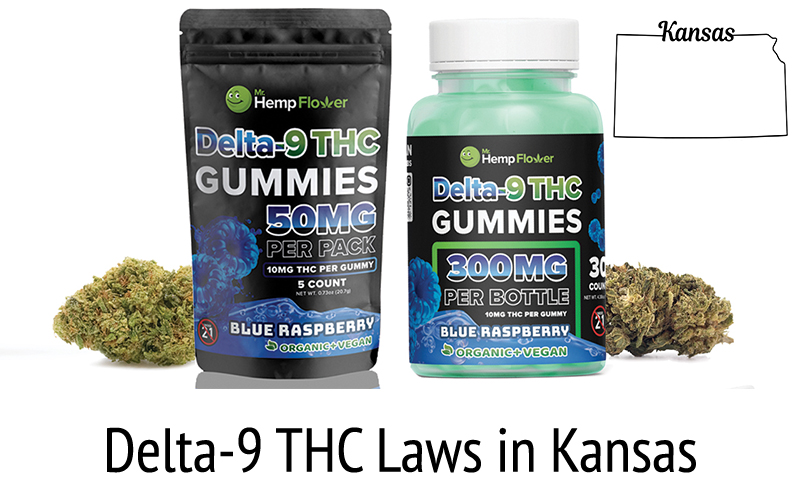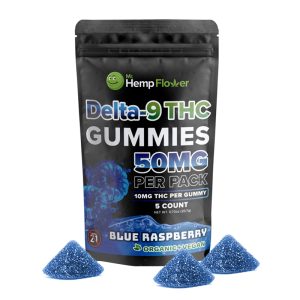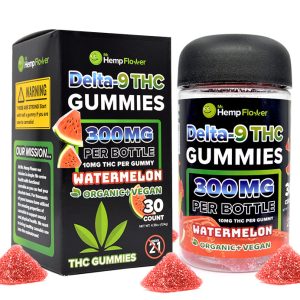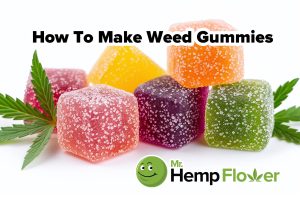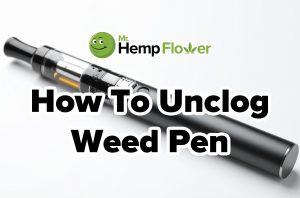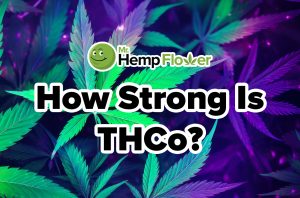Kansas residents can buy a limited spectrum of CBD products sold in the state, including oils, pills, powders, or topicals.
If you are willing to try the new delta 9 gummies, you’re probably wondering if they are legal in the Sunflower State. Let’s take a look.
Last Update: June 15, 2025
Summary
- Hemp-derived delta 9 gummies are not legal in Kansas because they contain THC.
- Under state’s hemp law, the sale, use and possession of hemp cannabinoid products infused with THC is illegal.
- In Kansas, only patients with debilitating conditions can obtain CBD oil with 5% THC. They need a doctor’s prescription to buy it.
- Recreational cannabis is illegal in Kansas.
- Mr. Hemp Flower offers premium full spectrum products compliant with the 2018 Farm Bill.
Can You Buy Delta 9 THC Gummies in Kansas?
Unfortunately, you can’t lawfully buy delta 9 gummies with less than 0.3% THC in Kansas because the state prohibits the sale of hemp products with any THC concentration.
If the law changes, Mr. Hemp Flower is here to serve you with the best cannabinoid products on the market. Our revolutionary cannabinoid formula brings you the power of whole plant hemp in a bite. Our Delta 9 Gummies are crafted with all-natural, vegan-friendly ingredients and a full range of cannabinoids and terpenes.
The interaction between all these compounds that constitute the plant’s profile provides a deeper experience and a more balanced effect.
At Mr. Hemp Flower, you can find tested, organic hemp products with all-natural ingredients. If you’re a beginner, you can start with half a gummy and wait for the effects to kick in. Gummies typically take 30-45 minutes to act, but the effects last for hours, so they are incredibly convenient to take before bed.
Read more: A State-by-State Delta 9 THC Legality Guide
Are Delta 9 Gummies Legal in Kansas?
No, hemp-derived delta 9 gummies are not legal in Kansas because they contain THC.
Kansas CBD/THC Laws
Kansas legalized hemp in April 2018 when Governor Jeff Colyer signed Senate Bill 263 or the Alternative Crop Research Act into law. This bill launched the state’s independent pilot program to research hemp with less than 0.3% THC in partnership with universities in Kansas.
On May 24, 2018, Governor Jeff Colyer signed Senate Bill 282, which amended the definition of marijuana to specifically exempt cannabidiol (CBD). This bill broadly legalized CBD and set the requirement that such products must contain zero THC to be legally sold.
After the enactment of the 2018 Farm Bill, Governor Laura Kelly signed House Bill 2167 into law. This bill legalized the creation of a Kansas Industrial Hemp Program but kept only CBD products with zero THC legal in the state. In Kansas, all hemp cultivation must be licensed by the Kansas Department of Agriculture.
Though it’s not the friendliest cannabis state, Kansas is slowly making progress in this realm. In 2019, the governor signed Senate Bill 28 into law — also known as Claire and Lola’s Law. This law allows the use of medical cannabis oil with no more than 5% THC for children with a recommendation by a physician.
What is Hemp-Derived Delta 9 THC?
Most people know about delta 9 THC. This is everyone’s favorite compound in marijuana. However, delta 9 is not only found in the marijuana plant, but it’s also present in the non-intoxicating variety of cannabis — hemp.
Hemp is the federally legal Cannabis sativa with a delta 9 THC concentration of less than 0.3%. As you might’ve guessed, legal delta 9 is extracted from the buds and flowers of federally compliant hemp plants. Regardless of its source, this cannabinoid is known for its intoxicating nature.
Research shows that in optimal doses, delta 9 THC is beneficial for pain and inflammation, anxiety, nausea and vomiting, low appetite, poor sleep, and more. Due to the entourage effect, it works best when blended with other cannabinoids and terpenes.
Hemp Compliant Delta 9 THC and Federal Law
Since you’re reading this, you’re probably aware of the legal complexities surrounding hemp cannabinoids — especially delta 8. The situation with delta 9 is entirely different because this cannabinoid is derived directly from the hemp plant, so no synthetic methods are involved in its making.
Also, the Farm Bill of 2018 legalized hemp and its “derivatives, extracts, cannabinoids, and isomers,” with a delta 9 concentration of less than 0.3 percent. The bill removed hemp and THC in hemp from the Controlled Substances Act and the definition of marijuana. Hemp is defined as:
“The term ‘hemp’ means the plant Cannabis sativa L. and any part of that plant, including the seeds thereof and all derivatives, extracts, cannabinoids, isomers, acids, salts, and salts of isomers, whether growing or not, with a delta-9-tetrahydrocannabinol concentration of not more than 0.3 percent on a dry weight basis [1].”
Meaning, hemp-derived delta 9 gummies are legal federally if their delta 9 THC concentration doesn’t exceed 0.3% by weight. A more complicated issue around this product is that it contains CBD and it comes in an edible form. Cannabidiol (CBD) from hemp hasn’t been explored or approved by the Food and Drug Administration as a food additive.
The rise of different hemp cannabinoid products has made the legality of each group of products questionable. But that hasn’t stopped the growth of the CBD industry, as the natural development prompted states to regulate rather than ban this compound.
One of the main questions surrounding delta 9 gummies is how are they legal when they’re intoxicating? As you can see from the above definition of hemp and hemp products, the only thing that makes a product legal is the level of Δ9-THC it contains.

Be Sure to Check Out:
Delta-9 THC FAQ
Is Delta 9 legal in all 50 states?
Delta 9 THC derived from hemp is legal on a federal level but has been restricted in a few states and Kansas is one of them.
What is stronger, Delta 9 or Delta 8?
Delta 9 is definitely more potent. According to anecdotal evidence and research, delta 8 is half less intoxicating and more sedative than Δ9-THC.
Does hemp have Delta 9?
Yes, hemp does have delta 9 THC. Under federal law, legal hemp contains less than 0.3% THC.
Read our legal disclaimer HERE. While we try to stay as up to date as possible on all state laws, you should do your own due diligence and work with a legal professional to ensure you are operating legally in your state or territory at all times.

